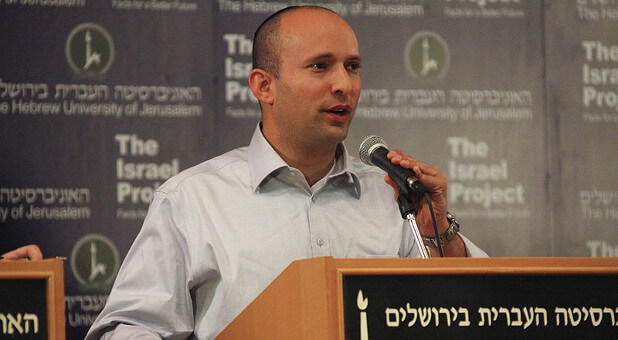Israel should discard the two-state solution when it comes to the conflict with the Palestinians and instead seek to “live with the problem,” Economy and Trade Minister Naftali Bennett (Habayit Hayehudi) said on Monday in a conference sponsored by the Yesha Council in Jerusalem.
The Yesha Council, an umbrella body of Jewish communities in Judea and Samaria, invited several government officials to speak at the conference, which focused on Israel’s public advocacy efforts on the world stage.
Bennett reiterated his stance that Israel should annex—“as quickly as possible”—virtually all the areas that were not handed over the Palestinian Authority under the Oslo accords, including the Jewish communities and a handful of Palestinian towns. He further advocated that Israel devise “aggressive” new plans to drastically improve the economic well-being of both the Jewish and Arab inhabitants of Judea and Samaria.
Bennett said that Israel must continue its settlement activity in Judea and Samaria “in full force, because only facts on the ground would make everyone understand that it is an unrealistic proposition to have a Palestinian entity in the Land of Israel.”
“The notion of having a two-state solution established in the Land of Israel is now at a dead end; never in Jewish history have so many people talked so much and expended so much energy in something so futile,” Bennett told the audience, stressing that Israel could not be called an occupier because it was on its own historic homeland.
He stressed that the sheer number of Jewish residents in Judea and Samaria meant that the two-state solution was no longer viable. “More than 10 percent of all Israelis live beyond what was known as the Green Line [Israel’s pre-1967 border with Jordan]; anyone walking in Judea and Samaria knows that what was negotiated in Annapolis and in Oslo was just divorced from reality,” he said. He noted that the pursuit of peace in such conferences and negotiating sessions has ultimately resulted in many deaths. Sometimes, a Western-style peace accord is beyond reach, he noted, expressing fear than many more would die before people abandon their “quest for a perfect solution.”
Deputy Foreign Minister Zeev Elkin (Likud) said most European diplomats he meets are wedded to the idea of a two-state solution. Reacting to Bennett’s comments, he said, “Not a single foreign minister in Europe would agree with what Bennett said, not even with 10 percent of what he said; dozens of European foreign ministers have met with me recently and all they talked about was the two-state solution.”
Last week, Deputy Defense Minister Danny Danon (Likud), considered a hawk on the Palestinian issue, said the government would never endorse a two-state solution. “If you will bring it to a vote in the government—nobody will bring it to a vote, it’s not smart to do it—but if you bring it to a vote, you will see the majority of Likud ministers, along with Habayit Hayehudi, will be against it,” Danon told The Times of Israel. Danon further said that Prime Minister Benjamin Netanyahu’s support for a two-state solution is tactical because such a prospect had zero chance of materializing. Danon’s comments triggered a media firestorm and prompted Netanyahu to distance himself from Danon’s statements. Justice Ministry Tzipi Livni (Hatnuah) even called Danon’s view “Danonism.”
For the original article, visit israelhayom.











































